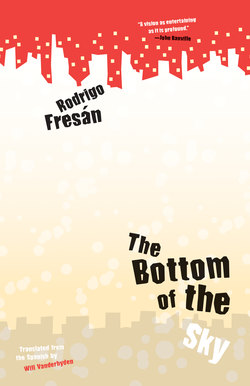Читать книгу Bottom of the Sky - Rodrigo Fresán - Страница 13
На сайте Литреса книга снята с продажи.
ОглавлениеRemember us, remember me, remember that in those days the inhabitants of our planet, of our tiny universe, were divided into interstellar travelers and creatures from other worlds.
The rest were just secondary characters.
The anonymous builders of the rocket.
Or men and women enslaved by distant creatures of impossible anatomy that, nevertheless, a great mystery, always spoke our language perfectly.
Or humans who practiced an extraterrestrial tongue that, an even greater mystery, was so similar to the English spoken by a foreigner of a not-too-distant country.
And astronaut or alien weren’t yet terms of common use.
They weren’t, like today, present equally in the mouths of children and the elderly. Those words, like a familiar flavor, easy to identify at first bite for teeth both young and new or old and fake.
It wasn’t like now (think of technological jargon as a new form of pornography, of the production of military and domestic gadgets of all size and utility, of faces and bodies modified by laser procedures, of a life after life, and of alternate realities tangled in a web of small computer screens), when there are days that I’m invaded by the suspicion that all the inhabitants of this planet are, without being aware of it, science-fiction writers.
Or, at least, characters created by science-fiction writers.
Back then, in the beginning, it was different.
Back then, in that now-old New Age, space was truly dark and, at the same time, a blank page to be filled with the flashes of our prayers and promises and supplications.
Back then we were paid to imagine the unimaginable and the future was always so remote, at a distance of centuries, of millennia.
And there were those who liked to write about earthlings climbing aboard rockets to climb ever higher.
And there were others who opted for the inverse approach, preferring to write about extraterrestrials who come here to lay waste to everything, sparing a lone witness to put it all in writing. Thus, the ending of their story superimposing and anticipating itself in the beginning of our story, its pages left behind to instruct those who, with luck, would come after and start over. A new tribe of individuals of scientific aspect—lab coats and glasses and always-lit pipes under spacesuits and helmets—building amid the rubble and ruins and trying to understand who all those armless, headless statues of onetime heroes or villains were. Future men, amnesiac from centuries of walking through immortal ruins, unable to specify what took place, but imagining so much about what might have happened to the ancient denizens of those palaces and mausoleums and thereby creating, without wanting to but maybe with an inkling, a new form of reverse science fiction. A science fiction that would be nothing less than the myths, the events, and, finally, History. Because the History of what was—every new theory, every historical essay—is also a science-fiction novel.
What has happened is as fantastic as what is to come.
The past never stops moving though it appears motionless.
Like snow.
And yes, there was snow and there were snowmen, men made of snow.
And there we were—Ezra and I—in the snow.
And our planet is never more another planet—never does it feel more alien and distant, never so new and so different—than after a long and heavy snowfall.
And that year—remember it, remember us, like this—it snowed like never before.
And the two of us there, in the snow, standing in front of all those snowmen and that huge sphere. And it was as if we—Ezra and I—were ascending through the snow, motionless but alive in the pale light of the new day. And it was as if each snowflake—distinct from all the others—were a singular star. And snow—see the snow, feel the snow—makes everyone more poetic and makes me a bad poet.
And a gust of wind and you in the window.
And it was as if the wind had been invented to blow through your hair and proclaim that, though invisible, it too had a shape: the shape of your hair in disarray, in the air of that dark daybreak, was the shape of the wind.
And the snowflakes moved, pushed by a rush of energy, and the two of us, there, like the inhabitants of one of those glass and plastic globes that a higher power, or a giant, shakes to create a white and imprisoning storm.
A storm that fits in the palm of the hand that summons and sustains it.
And the two of us—Ezra and I—there inside, happily trapped, in your hands.
We, the two of us, who called ourselves The Faraways and who began and ended in ourselves.
And yet, true enough, there were others who considered themselves Faraways—in the vicinity of our barely plural singularity, a singularity of only two—simply out of proximity. Orbiting around us until, inevitably, they grew tired of it and of our indifference, and went off in search of more interesting attractions and bigger groups of friends.
And it was because the two of us—Ezra and I—felt we were so different.
And we liked to consider ourselves distant beings, of a familiar configuration but driven by a decidedly alien will. The will to know ourselves intruders and subjects of a private mandate to travel great distances, to cross space, to arrive at the bottom of the sky, and, once there, to turn around and go back to the point of departure. And, only then, return to a home we didn’t recognize and that didn’t recognize us.
Then we would wander aimlessly through streets and parks.
Our bloodline would be dissipated and impossible to detect in the mix of new bloods.
We would have become foreigners whose only comfort would be to write about precisely that: about belonging nowhere after seeing everything.
And we would be happy.
